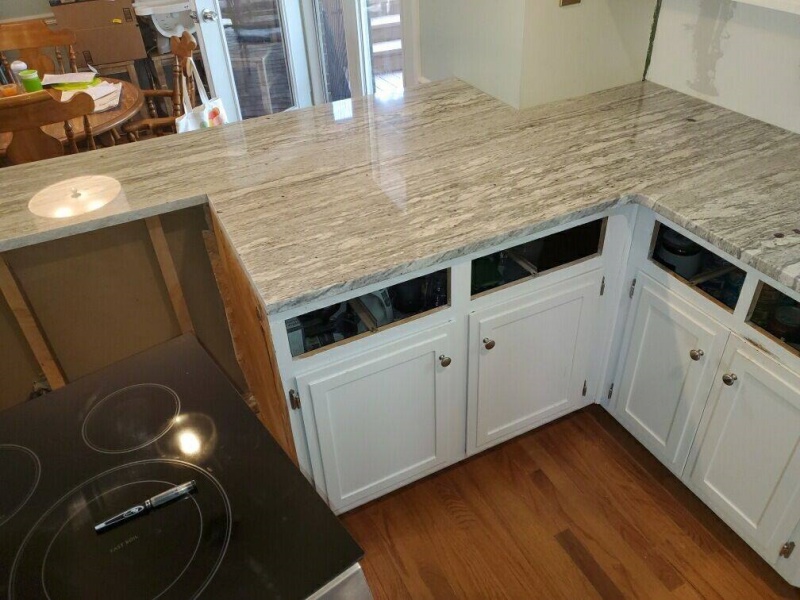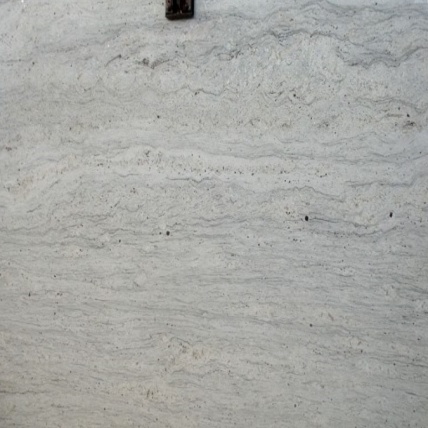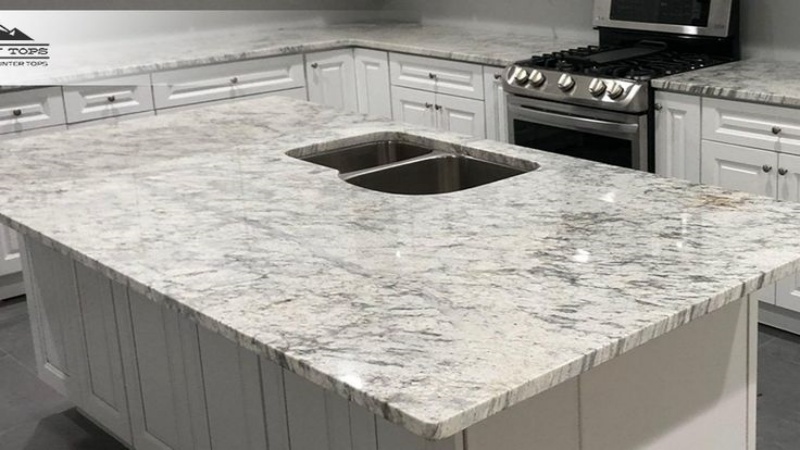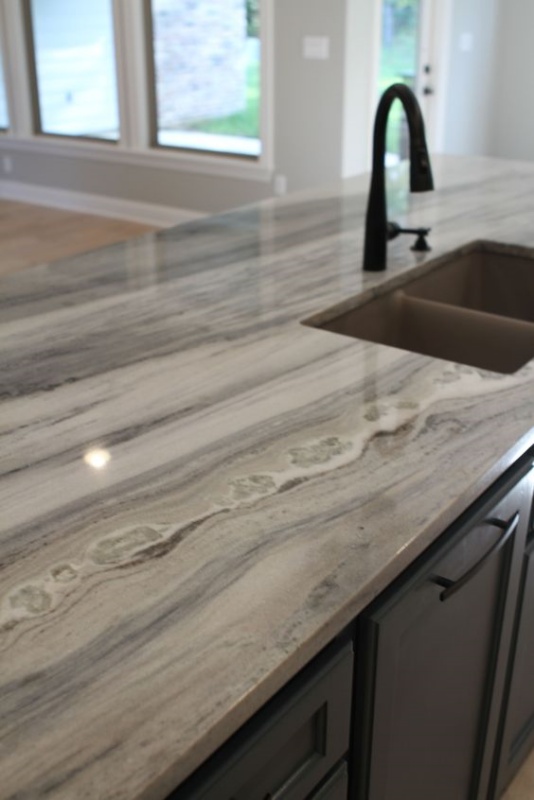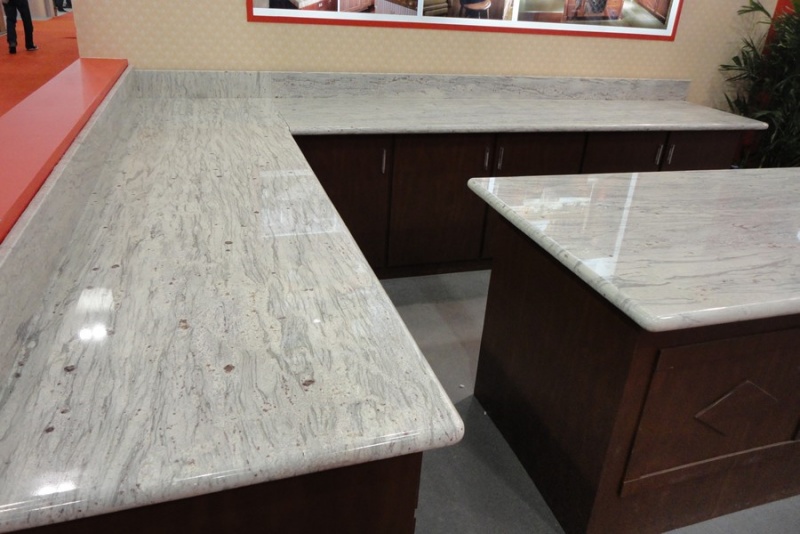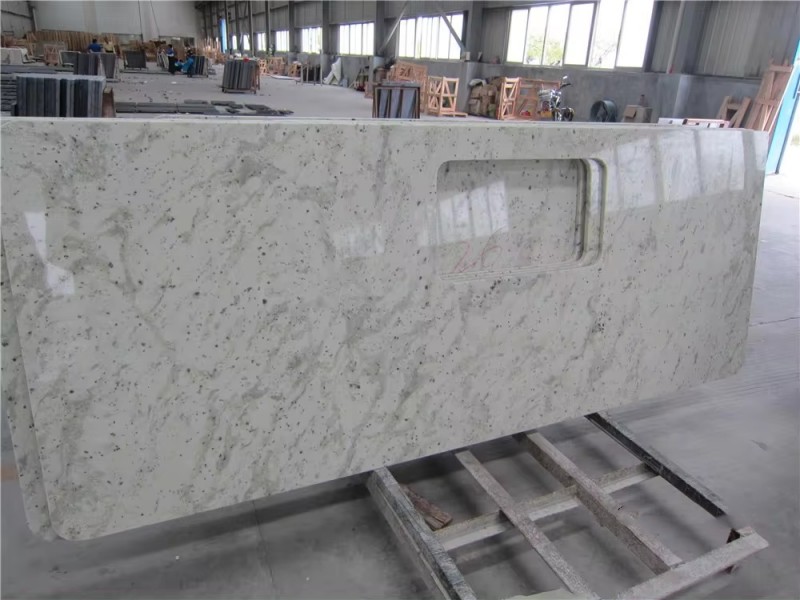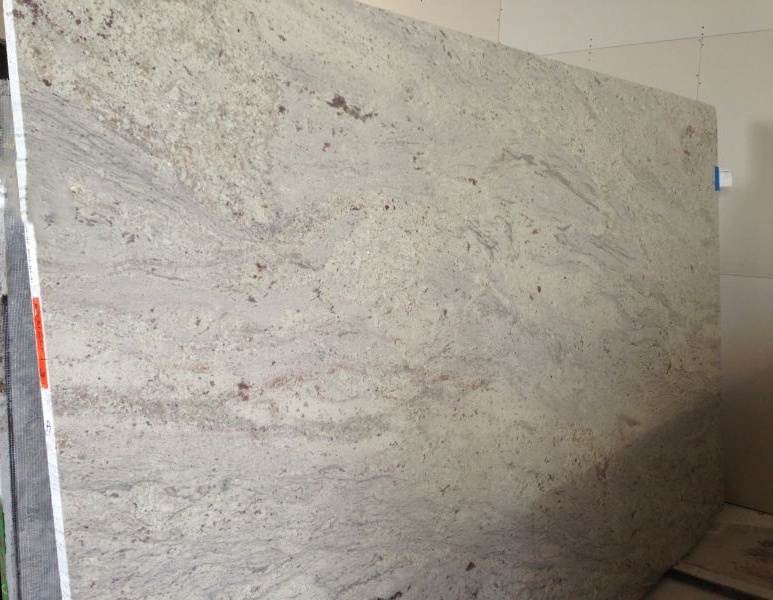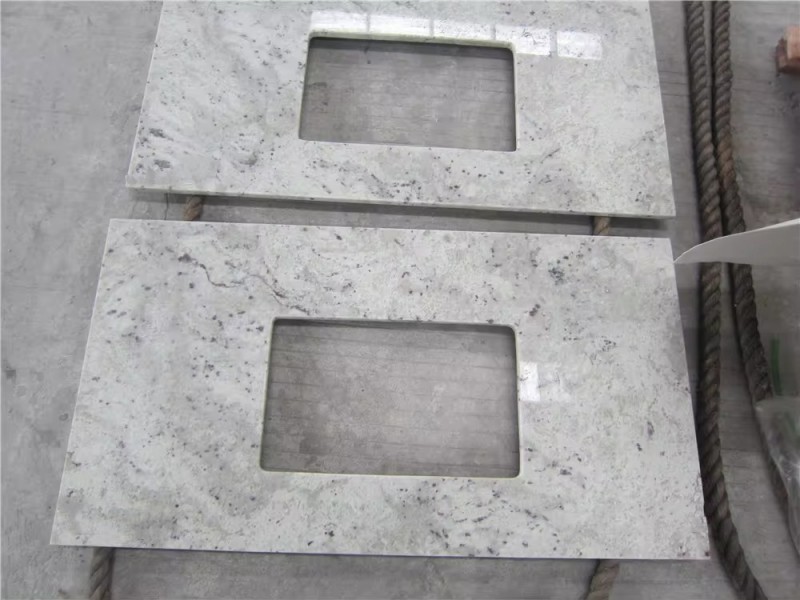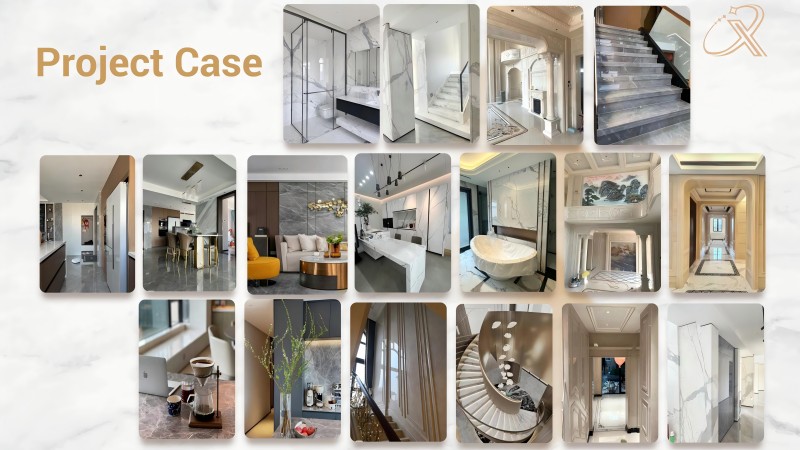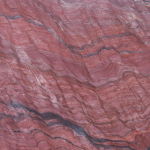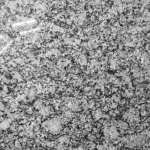River White Granite
River White Granite is a popular type of granite known for its soft, elegant appearance and distinctive, flowing patterns that resemble a river or stream. It is widely used in both residential and commercial interior design due to its attractive aesthetic and durable properties. Here’s a more detailed breakdown of River White Granite:
Key Characteristics of River White Granite:
- Appearance:
- Color: River White Granite typically features a pale white or light gray base with a combination of light and medium-gray veins. The veins are often interspersed with specks of brown, black, and even subtle hints of burgundy or gold, giving it a “river-like” or flowing appearance.
- Patterning: The pattern in River White Granite is typically characterized by a mix of soft, sweeping veins and speckling, which can create a tranquil and natural look. The flowing patterns can give the stone an organic, almost marble-like feel, while still maintaining the durability of granite.
- Subtle Elegance: Its subdued tones make it a versatile material, perfect for modern, contemporary, traditional, or transitional designs. The soft coloring also allows it to blend seamlessly with a variety of other materials, such as wood, metal, or glass.
- Durability:
- Hardness: As a granite, River White Granite is a very durable and hard natural stone. It is highly resistant to scratching, chipping, and general wear, making it suitable for high-traffic areas like kitchen countertops, bathroom vanities, and floors.
- Heat and Stain Resistance: Granite is naturally heat-resistant and can handle exposure to hot pots and pans without damage. It is also resistant to stains, although periodic sealing is recommended to maintain its stain resistance over time.
- Low Maintenance: Like other granites, River White Granite is relatively low-maintenance. It only requires occasional sealing (once a year or so, depending on usage) to ensure it remains stain-resistant and retains its appearance.
- Versatility:
- Applications: River White Granite is commonly used in a variety of applications, including:
- Countertops: It is a popular choice for kitchen and bathroom countertops due to its durability and elegant aesthetic.
- Flooring: Its beautiful and consistent pattern makes it suitable for use as flooring in both residential and commercial spaces.
- Backsplashes and Wall Cladding: River White can be used to create sleek and sophisticated backsplashes or feature walls in kitchens and bathrooms.
- Vanities and Islands: The stone can create stunning kitchen islands, bathroom vanities, and other high-impact design features.
- Applications: River White Granite is commonly used in a variety of applications, including:
- Color Variations:
- Range of Light Tones: The predominant light gray or white base can vary slightly from slab to slab, with some slabs featuring stronger veining and contrasting specks, while others might be softer in their appearance.
- Vein Intensity: The intensity of the veins may vary between slabs. Some may feature bold, sweeping veins, while others may have more subtle, light veining.
- Aesthetic Appeal:
- Sophisticated and Calming Look: River White Granite’s subtle gray and white tones, paired with delicate veining, create a calming and sophisticated look, making it a popular choice for spaces where a clean, serene aesthetic is desired.
- Elegant and Timeless: Its timeless design means it won’t easily go out of style. River White Granite’s neutral tones can complement almost any decor style, from classic and traditional to sleek, modern interiors.
- Availability and Pricing:
- Availability: River White Granite is available in many regions, but the exact availability can vary depending on your location. Some slabs may be more common in certain areas, which could influence the price.
- Cost: As a mid-range granite, River White Granite is typically more affordable than some rarer or more exotic granite varieties, but it can be more expensive than some other stone types like quartz or marble. Pricing will depend on the size of the slab, quality, and the region in which it’s purchased.
How does compare River White Granite to other natural stones in terms of durability?
River White Granite is highly durable, but when compared to other natural stones, it has both advantages and some limitations. Here’s how it stacks up in terms of hardness, resistance to scratches, staining, and overall durability compared to other popular natural stones like marble, quartzite, and soapstone.
1. Hardness and Scratch Resistance
- River White Granite:
- Granite is a very hard material, scoring 6-7 on the Mohs scale of hardness. River White Granite’s mineral composition, which includes quartz, feldspar, and mica, gives it strong resistance to scratching and abrasions. It can withstand heavy use, making it ideal for kitchen countertops, floors, and other high-traffic areas.
- Scratch Resistance: Excellent. Granite is resistant to most everyday scratches, although hard materials like diamonds or ceramic knives can scratch it.
- Comparison with Other Stones:
- Marble: Marble is softer, with a Mohs hardness of about 3-5. This makes it more susceptible to scratching and etching, especially from acidic substances like vinegar, citrus, or wine. While marble can offer a luxurious aesthetic, it’s not as durable as granite for heavy-use areas.
- Quartzite: Quartzite is even harder than granite, usually scoring a 7 on the Mohs scale, making it slightly more scratch-resistant than River White Granite. Quartzite is ideal for high-wear areas where scratch resistance is critical.
- Soapstone: Soapstone is much softer (about 2.5 on the Mohs scale), meaning it scratches much more easily than granite. However, it’s still durable and resistant to heat, but it requires more care to maintain its surface.
2. Stain Resistance
- River White Granite:
- Granite is a relatively non-porous material, but it still requires periodic sealing to maintain its resistance to stains and liquids. Without sealing, certain oils or acidic liquids could cause stains over time, especially on lighter-colored stones like River White Granite.
- Stain Resistance: Good. With proper sealing, River White Granite is resistant to most stains, making it a reliable choice for kitchen and bathroom countertops.
- Comparison with Other Stones:
- Marble: Marble is more porous than granite and tends to stain more easily, especially from acidic substances (like wine, coffee, or citrus). It also requires more frequent sealing to maintain its resistance to stains.
- Quartzite: Quartzite is generally non-porous or only slightly porous, making it highly resistant to stains. Like granite, it may need sealing but generally requires less maintenance than marble in this regard.
- Soapstone: Soapstone is non-porous and naturally resists stains, though it may develop a patina over time. While it’s less prone to staining than marble, it’s softer and more prone to scratches.
3. Heat Resistance
- River White Granite:
- Granite is highly heat-resistant and can tolerate exposure to hot pots and pans without damage. River White Granite, like other granite varieties, is ideal for kitchen surfaces that experience regular heat.
- Heat Resistance: Excellent. Granite won’t be damaged by hot cookware, although it’s still recommended to use trivets or hot pads to prevent any thermal shock.
- Comparison with Other Stones:
- Marble: Marble is heat-resistant but is more prone to surface damage, such as discoloration or cracking, from extreme or rapid temperature changes. Like granite, it’s generally safe to use in kitchens, though care should be taken around very hot objects.
- Quartzite: Quartzite is even more heat-resistant than granite, making it an excellent choice for areas exposed to high temperatures. It can handle hot cookware without sustaining damage.
- Soapstone: Soapstone has excellent heat resistance and can withstand direct contact with hot pans or pots. It’s often chosen for wood stoves and fireplace surrounds because it can handle heat without damage, though it may discolor over time.
4. Chipping and Cracking Resistance
- River White Granite:
- Granite is highly resistant to chipping and cracking. However, like all stone surfaces, it can crack or chip if subjected to extreme force (e.g., dropping a heavy object). The dense, tough nature of granite helps it withstand impacts better than softer stones.
- Chipping Resistance: Very good. Granite is less likely to chip compared to softer stones, although edges may need to be rounded or treated to prevent chips.
- Comparison with Other Stones:
- Marble: Marble is more prone to chipping and cracking due to its softer composition. It’s less resilient than granite and quartzite in terms of withstanding impacts.
- Quartzite: Quartzite is even tougher than granite, making it more resistant to chipping and cracking. It is ideal for areas where durability is a concern.
- Soapstone: Soapstone is more prone to scratching, but it is less likely to chip or crack because of its softness and resilience under pressure. However, it can develop dents over time, especially with heavy use.
5. Maintenance Requirements
- River White Granite:
- Granite is relatively low-maintenance compared to softer stones like marble, but it still requires sealing to prevent stains and maintain its appearance. With proper care, it can last a long time without losing its beauty.
- Maintenance: Moderate. It’s low-maintenance if sealed regularly and cleaned with non-abrasive cleaners, but neglecting to reseal can lead to stains or dullness.
- Comparison with Other Stones:
- Marble: Marble requires more frequent maintenance, including regular sealing, as it is more susceptible to staining and etching. It needs to be cleaned with care to prevent damage.
- Quartzite: Quartzite requires less maintenance than marble but may need occasional sealing to keep it resistant to stains. It’s generally low-maintenance and more durable than marble.
- Soapstone: Soapstone requires minimal maintenance as it doesn’t need sealing, but it will develop a patina over time. Regular oiling can help enhance its appearance and prevent dryness or cracks.
6. Longevity
- River White Granite:
- Granite is one of the most durable natural stones available and, with proper care, can last a lifetime. Its strength, combined with resistance to scratches, heat, and stains, makes it ideal for long-term use in both residential and commercial settings.
- Longevity: Exceptional. Granite is a long-lasting material and will typically maintain its beauty and functionality for decades.
- Comparison with Other Stones:
- Marble: Marble is still a durable material, but it does not last as long as granite due to its susceptibility to scratching, staining, and etching. It requires more upkeep to retain its beauty over time.
- Quartzite: Quartzite has an excellent lifespan and is highly durable, even more so than granite in some cases. It is more resistant to damage and wear, making it a great option for those looking for longevity.
- Soapstone: Soapstone is durable but requires more care to maintain its surface. It can last a long time but may show signs of aging more quickly than granite or quartzite.
What’s the Application of River White Granite?
River White Granite a range of high-end interior projects since its beauty and unusual tint are widely appreciated.
1.River White Granite Granite Countertop :River White Granite is often used to create stunning kitchen countertops and bathroom vanity tops. Its striking white color and intricate veining add elegance and sophistication to these spaces.
2.Wall Cladding: As a wall covering,River White Granite can create a focal point in any room. It is used in both residential and commercial settings to enhance the visual appeal of walls.
3.Flooring: While it is less commonly used for flooring compared to harder stones like granite ,River White Granite still be used in areas with light foot traffic, such as bathrooms, entryways, and other interior spaces.
4.Feature Walls: The dramatic veining and color variations of River White Granite make it ideal for creating accent walls or feature walls in living rooms, dining rooms, or even hotel lobbies.
5.Decorative Items: Smaller pieces of River White Granite, such as tabletops, fireplace surrounds, and decorative objects, can be used to add a touch of luxury and sophistication to interior design.
6.Bathroom Applications: Besides vanity tops,River White Granite can be used for shower walls, bathtub surrounds, and other bathroom surfaces to create a spa-like atmosphere.
7.Furniture: Custom furniture items like side tables, dining tables, and coffee tables. These works of art that are also useful elevate any room. Each furniture piece is distinctive and draws attention because of the distinctive patterns and colours of River White Granite
8.Art Installations: Designers and artists frequently work with River White Granite to produce one-of-a-kind art installations. In galleries, public areas, and private collections, artistic works are made stand out by the depth and personality that the natural beauty of the stone provides.
What are the unique features of River White Granite that make it appealing for interior design?
River White Granite is a highly sought-after natural stone, especially in the realm of interior design, due to its unique aesthetic and versatile qualities. Here are the key features that make River White Granite especially appealing for interior design:
1. Elegant and Timeless Aesthetic
- Soft, Subtle Colors: River White Granite features a beautiful blend of soft white, light gray, and subtle veins in shades of silver, gold, brown, and even light burgundy. This delicate color palette provides a refined and elegant look, making it perfect for a wide range of interior styles, from modern and contemporary to traditional and rustic.
- Sleek and Sophisticated Veining: The swirling veins and soft speckles within the stone give it a fluid, organic feel, almost like a river’s movement. These natural patterns create visual interest without being overwhelming, adding depth and dimension to surfaces like countertops, backsplashes, and flooring.
- Neutral yet Striking: While River White Granite is neutral enough to work with virtually any color scheme, its distinctive veining provides just the right amount of drama and uniqueness. It pairs beautifully with both warm and cool tones, allowing for endless design possibilities.
2. Versatility in Design Styles
- Complementing Various Styles: River White Granite’s neutral colors and flowing patterns allow it to blend effortlessly into many different interior design styles:
- Modern and Contemporary: The clean lines and polished finish of River White Granite make it ideal for sleek, minimalist interiors.
- Traditional and Transitional: The softer hues and elegant veining work well with more classic or transitional designs, where a timeless aesthetic is desired.
- Rustic or Farmhouse: When paired with natural materials like wood, this granite can add sophistication and balance to rustic or farmhouse-style kitchens and bathrooms.
- Great for Open Concept Spaces: Because of its neutral tones and elegant yet understated patterns, River White Granite is a popular choice for open-concept spaces, like kitchens and living areas, where it ties different design elements together without clashing with the surroundings.
3. Durability and Practicality
- Highly Durable Surface: Granite is one of the most durable natural stones, making River White Granite an excellent choice for high-traffic areas. It’s resistant to scratches, stains, and heat, making it ideal for kitchen countertops, bathroom vanities, and floors.
- Low Maintenance: River White Granite is relatively low-maintenance compared to other natural stones like marble. It only requires periodic sealing (about once a year), and with proper care, it retains its beauty for decades. The stone’s resistance to stains and liquids, especially when sealed, ensures that it remains pristine with minimal effort.
- Heat and Scratch Resistance: The stone can withstand high temperatures from cookware and utensils, making it an excellent choice for kitchens where durability is essential. It also resists scratching from knives and other sharp objects, unlike softer stones like marble.
4. Natural Elegance and Uniqueness
- One-of-a-Kind Patterns: Because River White Granite is a natural stone, no two slabs are exactly the same. Each slab has its own unique pattern, which ensures that the final installation is always one-of-a-kind. The variations in veining and speckling give the stone character and beauty, adding individuality to every design.
- Organic Flow and Movement: The veining in River White Granite resembles the smooth, flowing lines of a river, creating a sense of movement within the stone. This natural patterning makes it perfect for creating focal points, such as a kitchen island or an accent wall, where the stone can be admired and appreciated for its inherent beauty.
5. Light Reflectivity and Brightness
- Light-Reflective Qualities: The light gray and white tones in River White Granite have a natural sheen that can help brighten up a space. Its reflective surface can make a room feel larger, more open, and more airy, especially in spaces that receive natural light.
- Enhances Natural Light: When used in areas with good lighting, the granite’s reflective properties will capture and amplify light, making it an excellent choice for spaces that need a boost of brightness. It pairs beautifully with large windows, skylights, or well-lit rooms.
6. Flexible for Different Applications
- Countertops: River White Granite is commonly used for kitchen and bathroom countertops. Its ability to withstand heat, stains, and scratches makes it ideal for these high-use surfaces. The stone’s timeless beauty also enhances the overall look of the kitchen or bathroom, turning functional surfaces into works of art.
- Backsplashes and Wall Cladding: River White Granite is also a popular material for backsplashes and wall cladding. Its elegant veins create a dramatic yet soft statement on kitchen walls or bathroom backsplashes. It can be used to create a cohesive look when paired with granite countertops or as a contrasting feature against other materials.
- Flooring: The durability and visual appeal of River White Granite make it a great option for both residential and commercial flooring. It can be used in high-traffic areas like hallways, entryways, living rooms, or bathrooms. The stone’s natural elegance can elevate the design of a space while providing a long-lasting, easy-to-clean surface.
- Vanities and Islands: River White Granite’s stunning appearance and practicality make it a favored choice for bathroom vanities and kitchen islands. Its timeless beauty can become the centerpiece of the room, making it a focal point that enhances the entire space.
7. Seamless Integration with Other Materials
- Pairs Well with Wood, Metal, and Glass: River White Granite’s neutral tones and soft patterns make it easy to combine with other materials. It pairs beautifully with wooden cabinetry, adding warmth and contrast, and with metal accents (e.g., stainless steel or brass), offering a sophisticated touch. It also works well alongside glass elements for a more contemporary or luxurious look.
- Works with a Variety of Color Palettes: Its color neutrality makes River White Granite adaptable to a wide variety of color schemes. It can complement bold or muted colors, whether you’re designing a monochromatic space, a bold contrast, or a more natural, earthy palette.
8. Appeal to a Wide Range of Tastes
- Universal Appeal: River White Granite has a universally appealing aesthetic that is neither too bold nor too understated. Its calm, sophisticated look works for both modern and classic interiors. This makes it a popular choice for homeowners and designers who want a versatile stone that can adapt to various tastes and design sensibilities.
- Luxury and Value: River White Granite adds a touch of luxury to any space. While not as rare or exotic as some other granite varieties, it is still considered a high-end material, which increases the perceived value of a home or commercial space.
9. Eco-Friendly Choice
- Natural and Sustainable: River White Granite, like all natural stones, is a sustainable material. If sourced responsibly, it can be a good choice for environmentally conscious projects. It is a durable and long-lasting material, reducing the need for replacements and minimizing waste over time.
- Low Carbon Footprint: While transportation of the stone can contribute to carbon emissions, granite’s longevity and low maintenance make it an environmentally responsible option in the long term.
Factors affecting River White Granite price?
The price of River White Granite can vary widely depending on several factors, including its quality, origin, and the specific characteristics of the stone. Here are the key factors that affect the price of River White Granite:
1. Quality and Grade of the Stone
- Stone Quality: River White Granite comes in different grades, ranging from commercial-grade to premium-grade. Higher-quality stones with fewer imperfections, more consistent veining, and a uniform color are typically more expensive. Stones with less visible spots, scratches, or blemishes will generally cost more due to their aesthetic appeal and uniformity.
- Polishing and Finish: The level of finish on the stone can also affect its price. A polished finish is the most common and can increase the cost of the material compared to a more basic, honed, or leathered finish. Polished slabs tend to be more expensive due to the time and labor involved in achieving a high-gloss, smooth surface.
2. Size and Thickness of the Slab
- Slab Size: The size of the slabs you purchase directly impacts the cost. Larger slabs (i.e., those with fewer seams) typically cost more because they provide more material. Custom cuts for specific projects can also increase the overall price due to additional labor and waste considerations.
- Thickness of the Slab: The thickness of the granite slab also influences the price. Standard thicknesses are typically around 2 cm (3/4 inch) and 3 cm (1 1/4 inch), with thicker slabs generally being more expensive due to the extra material used and increased weight.
3. Origin and Sourcing of the Granite
- Geographic Origin: River White Granite is typically sourced from quarries in countries like India and Brazil, although it can also be found in other regions. The country of origin can affect the price based on factors such as transportation costs, the rarity of the material in that region, and the availability of the stone.
- Imports: Imported granite, especially from distant countries like India or Brazil, may incur higher shipping costs, customs duties, and taxes, making the stone more expensive than locally sourced granite.
- Local Availability: If River White Granite is more readily available in a specific region, the price may be lower compared to areas where the stone is less common or needs to be imported.
4. Demand and Market Trends
- Current Market Trends: Like any product, the demand for River White Granite can fluctuate based on market trends, popularity, and design preferences. If the stone becomes highly popular in a given year, the demand will increase, and so will the price.
- Exotic vs. Common Variations: River White Granite may have different levels of veining or color variations, and the more rare and unique variations (e.g., slabs with bold, contrasting veining or a particular coloration) could command higher prices.
5. Shipping and Transportation Costs
- Shipping Distance and Method: If the granite is sourced internationally, shipping costs can significantly impact the final price. The farther the stone has to be transported, the higher the shipping fees will be. Additionally, the method of transportation (e.g., freight shipping, air transport) can further influence the cost.
- Local Transportation and Handling: Once the granite reaches a local warehouse or supplier, there may be additional costs for handling, storage, and delivery to the project site. Heavy or bulky granite slabs can require specialized equipment for transportation, which can increase costs.
6. Fabrication and Installation Costs
- Customization and Cutting: The cost of cutting, shaping, and fabricating the granite to meet your specific design needs can add to the overall price. More intricate cuts or designs (such as custom edges, curves, or intricate patterns) will incur additional costs for labor and equipment.
- Installation Costs: Labor costs for installation are another important factor. Professional installers charge based on the complexity of the project and the amount of granite being used. Installation costs can vary by region and the level of expertise required for the job.
7. Sealing and Maintenance Considerations
- Sealing: While River White Granite is naturally durable, it requires periodic sealing to maintain its resistance to stains and liquids. Some suppliers may include the cost of sealing as part of the package, while others may charge extra for this service. The type of sealant used can also affect the overall cost.
- Long-Term Maintenance: The maintenance requirements for granite, such as periodic resealing, can also factor into the total cost of ownership. While granite is low-maintenance overall, the initial sealing and any ongoing maintenance requirements (if not included in the installation) can add to the cost over time.
8. Regional Pricing Differences
- Local vs. Imported Pricing: The cost of River White Granite may differ based on the region in which you are purchasing it. Local suppliers may offer better pricing, while imported granite may be more expensive due to additional shipping and import duties.
- Regional Economic Factors: In some areas, granite suppliers may face higher operational costs (e.g., labor, rent, utilities), which could lead to higher prices for the stone. Conversely, in regions with a competitive market and many suppliers, prices may be lower due to increased competition.
9. Finish and Customization Options
- Customized Cuts and Patterns: Custom fabrication, such as specific edge treatments (e.g., beveled, bullnose, or ogee edges), or custom patterns (such as bookmatching or creating a waterfall effect) can add significant costs to the price of River White Granite. More intricate or customized designs will require specialized labor and expertise.
- Finish Variations: The type of finish applied to the granite—whether polished, honed, leathered, or matte—can affect the cost. Polished finishes are generally more expensive due to the labor-intensive process, while honed finishes may cost slightly less.
10. Supplier and Brand Reputation
- Supplier Pricing Structure: Different suppliers may offer the same material at different price points. Larger, well-established suppliers with a reputation for high-quality service may charge more than smaller, less-known vendors.
- Brand or Premium Pricing: Some brands or suppliers may charge more for premium services, including better quality control, customer service, or extended warranties. Additionally, certain suppliers might offer unique grades or hand-picked slabs, which can increase the cost.
Why Opt For Xiamen Funshine Stone?
1.Our design consultation service at Funshine Stone gives our customers peace of mind, high-quality stone, and professional guidance. Our expertise lies in natural stone design tiles, and we offer comprehensive “top to bottom” consulting to realize your idea.
2.With a combined 30 years of project expertise, we have worked on a vast array of projects and established enduring relationships with numerous people.
3.With a huge assortment of natural and engineered stones, including marble, granite, bluestone, basalt, travertine, terrazzo, quartz, and more, Funshine Stone is pleased to provide one of the largest selections available. It is clear that our use of the best stone available is superior.







